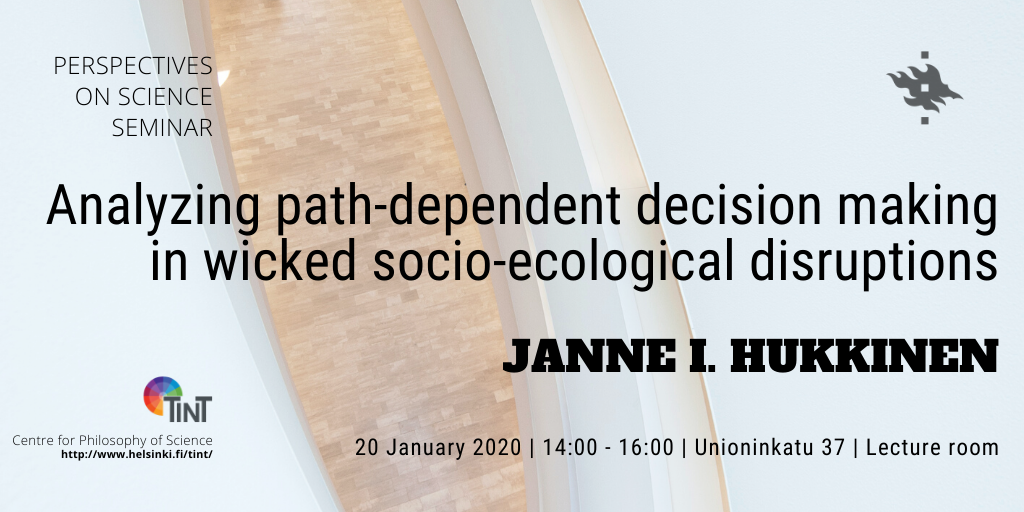At the year’s first Perspectives on Science seminar on 20.1., Janne I. Hukkinen (University of Helsinki & SRC/WISE consortium) will give a presentation on “Analyzing path-dependent decision making in wicked socio-ecological disruptions”.
Perspectives on Science is a weekly research seminar which brings together experts from science studies and philosophy of science. It is organized by TINT, the Centre for Philosophy of Social Science at the University of Helsinki. More information about the seminar here.
The seminar will take place on Unioninkatu 37, in the lecture room, from 2 to 4 pm.
Author bio:
Janne I. Hukkinen (PhD, University of California Berkeley, 1990) is professor of environmental policy at the University of Helsinki. He studies the cognitive aspects of sustainability assessment and strategy, with empirical applications in participation, expertise and risk in environmental policy. Hukkinen is a Member of The Finnish Society of Sciences and Letters, Editor of the journal Ecological Economics, and Expert Counsellor on the Environment for the Supreme Administrative Court of Finland. In addition to over 90 peer-reviewed scientific articles or book chapters, he is the author of Sustainability Networks (2008) and Institutions in Environmental Management (1999), both published by Routledge.
Abstract:
The magnitude and speed of change in intertwined webs of human-environmental systems pose unprecedented challenges for decision makers. On one hand, human-induced environmental changes have pushed Earth’s socio-ecological systems into an era of chronic, complex and rapid disruptions, which call for quick decisions and effective implementation. Decisions are often made in an intuitive crisis mode within a brief window of opportunity. On the other hand, the complexity, interconnectedness, and long lead times of the problems at hand would require thoughtful weighing of evidence by experts from a broad range of professions and disciplines.
Here we discuss contexts and processes of decision making that could prevent decisions made under time pressure from paving the way to unwanted socio-ecological disruptions decades into the future. We explore how the control room model of high reliability management might be transferred to a strategic policy making context involving urgent decisions with long-term lock-in effects. We aim to show that simulation exercises based on analogous application of decision principles from a high reliability control room, or the Policy Operations Room (POR) model, can help policy makers to consider the long-term path dependence, be it desirable or not, in urgent decisions made during wicked socio-ecological disruptions. We hypothesize that in long-term strategic policy making settings it is possible to benefit from the same operational procedures with which control room operators stabilize critical infrastructures and ensure reliable operations in the short term.

